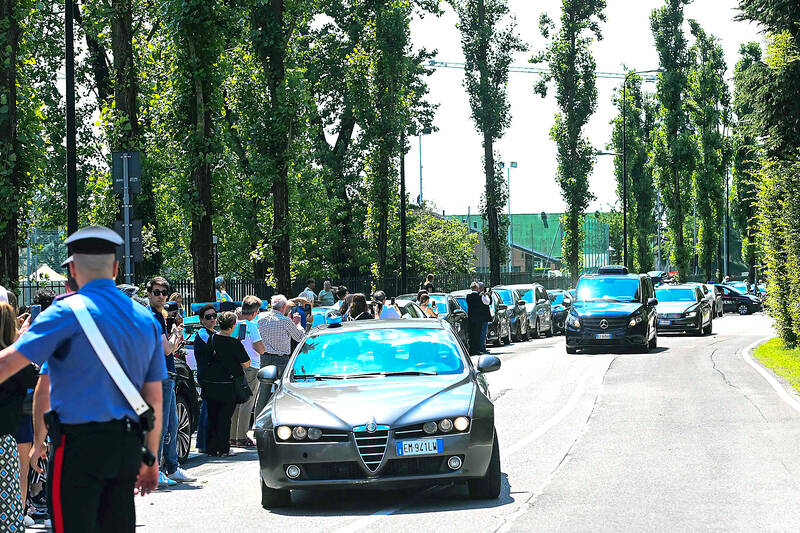Silvio Berlusconi, the former prime minister who reshaped Italy’s political and cultural landscape while fending off multiple legal and sex scandals, died yesterday aged 86.
He had been suffering from a rare type of blood cancer.
Mourners laid flowers and notes outside Villa San Martino, Berlusconi’s home near Milan, with one reading simply: “We will miss you.”

Photo: AFP
Berlusconi is to have a state funeral in Milan’s Duomo Cathedral tomorrow.
He had been in ill health for years, from heart surgery in 2016 to a 2020 hospitalization for COVID-19. Despite being re-elected to the senate last year, he was rarely seen in public.
However, he remained the official head of his right-wing Forza Italia party, a junior — and occasionally troublesome — partner in Italian Prime Minister Giorgia Meloni’s coalition government.

Photo: AFP
“Berlusconi was above all a fighter,” Meloni said in a video message posted on Twitter.
“He was a man who was not afraid to defend his convictions, and it was precisely that courage and determination which made him one of the most influential men in Italy’s history,” she said.
As Berlusconi’s body was moved from the hospital to Villa San Martino, tributes flowed in from international leaders.
Russian President Vladimir Putin — whom Berlusconi controversially defended following the invasion of Ukraine — said his death was an “irreparable loss” and hailed him as a “true friend.”

‘TAIWAN-FRIENDLY’: The last time the Web site fact sheet removed the lines on the US not supporting Taiwanese independence was during the Biden administration in 2022 The US Department of State has removed a statement on its Web site that it does not support Taiwanese independence, among changes that the Taiwanese government praised yesterday as supporting Taiwan. The Taiwan-US relations fact sheet, produced by the department’s Bureau of East Asian and Pacific Affairs, previously stated that the US opposes “any unilateral changes to the status quo from either side; we do not support Taiwan independence; and we expect cross-strait differences to be resolved by peaceful means.” In the updated version published on Thursday, the line stating that the US does not support Taiwanese independence had been removed. The updated

‘CORRECT IDENTIFICATION’: Beginning in May, Taiwanese married to Japanese can register their home country as Taiwan in their spouse’s family record, ‘Nikkei Asia’ said The government yesterday thanked Japan for revising rules that would allow Taiwanese nationals married to Japanese citizens to list their home country as “Taiwan” in the official family record database. At present, Taiwanese have to select “China.” Minister of Foreign Affairs Lin Chia-lung (林佳龍) said the new rule, set to be implemented in May, would now “correctly” identify Taiwanese in Japan and help protect their rights, the Ministry of Foreign Affairs said in a statement. The statement was released after Nikkei Asia reported the new policy earlier yesterday. The name and nationality of a non-Japanese person marrying a Japanese national is added to the

AT RISK: The council reiterated that people should seriously consider the necessity of visiting China, after Beijing passed 22 guidelines to punish ‘die-hard’ separatists The Mainland Affairs Council (MAC) has since Jan. 1 last year received 65 petitions regarding Taiwanese who were interrogated or detained in China, MAC Minister Chiu Chui-cheng (邱垂正) said yesterday. Fifty-two either went missing or had their personal freedoms restricted, with some put in criminal detention, while 13 were interrogated and temporarily detained, he said in a radio interview. On June 21 last year, China announced 22 guidelines to punish “die-hard Taiwanese independence separatists,” allowing Chinese courts to try people in absentia. The guidelines are uncivilized and inhumane, allowing Beijing to seize assets and issue the death penalty, with no regard for potential

‘UNITED FRONT’ FRONTS: Barring contact with Huaqiao and Jinan universities is needed to stop China targeting Taiwanese students, the education minister said Taiwan has blacklisted two Chinese universities from conducting academic exchange programs in the nation after reports that the institutes are arms of Beijing’s United Front Work Department, Minister of Education Cheng Ying-yao (鄭英耀) said in an exclusive interview with the Chinese-language Liberty Times (the Taipei Times’ sister paper) published yesterday. China’s Huaqiao University in Xiamen and Quanzhou, as well as Jinan University in Guangzhou, which have 600 and 1,500 Taiwanese on their rolls respectively, are under direct control of the Chinese government’s political warfare branch, Cheng said, citing reports by national security officials. A comprehensive ban on Taiwanese institutions collaborating or